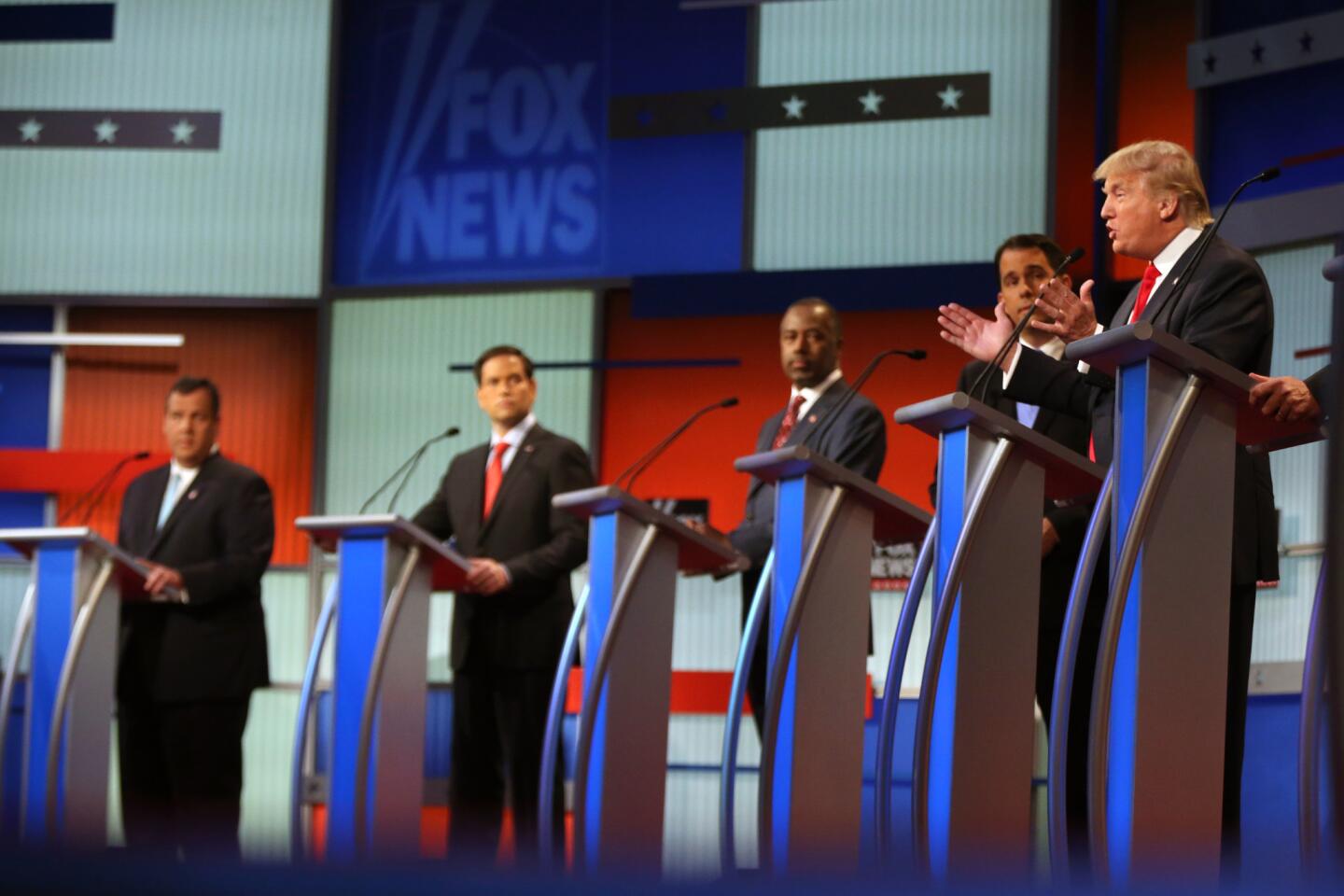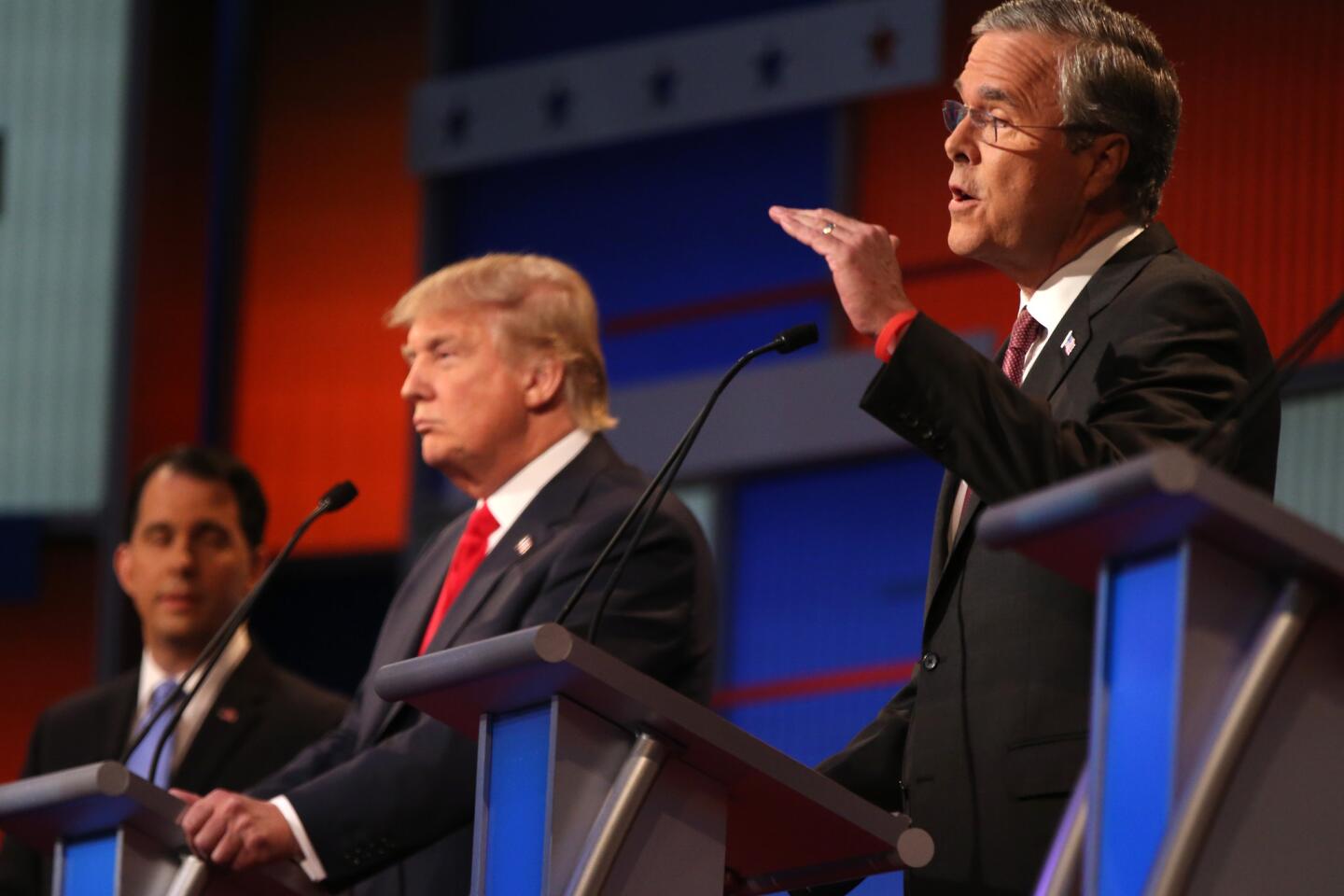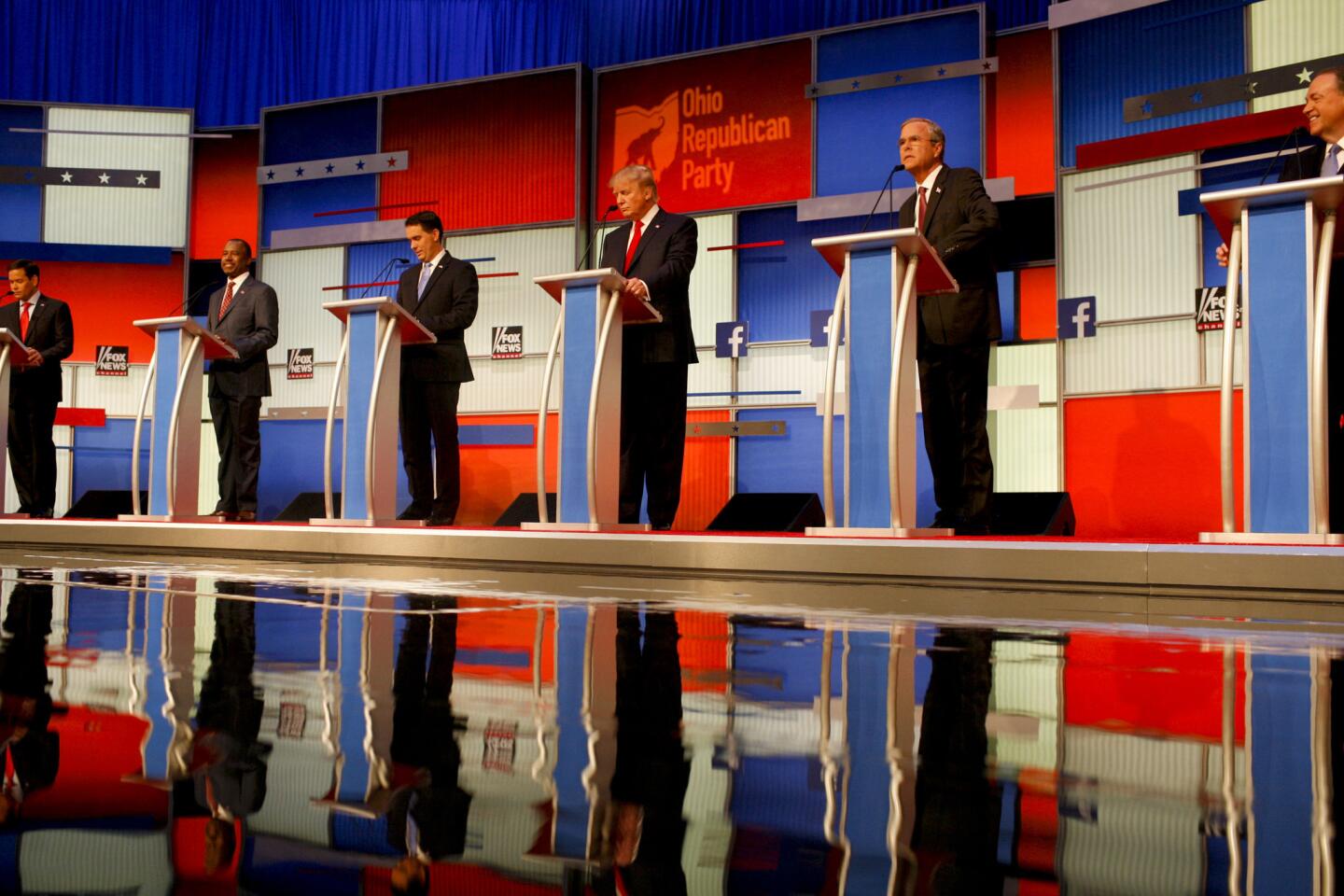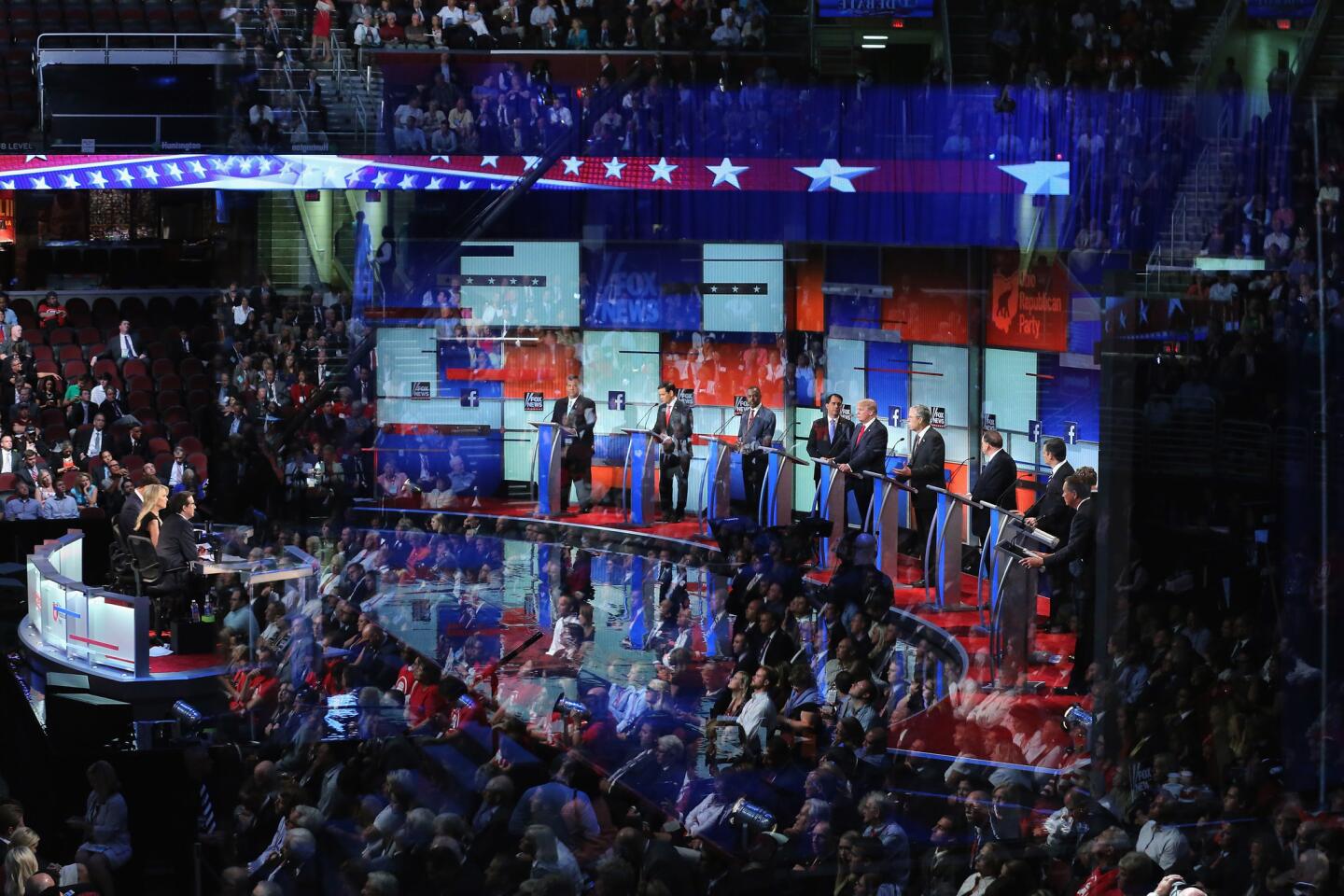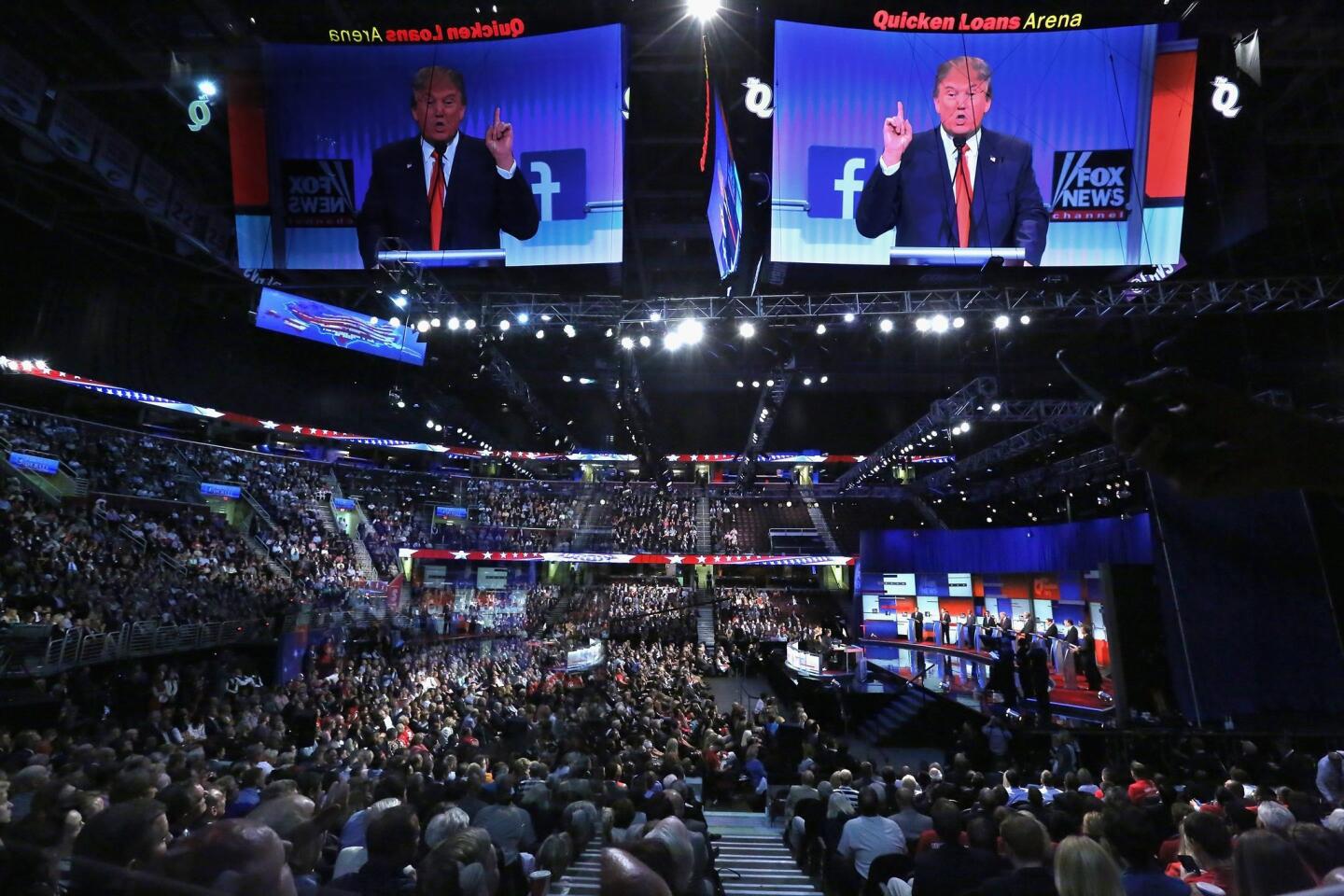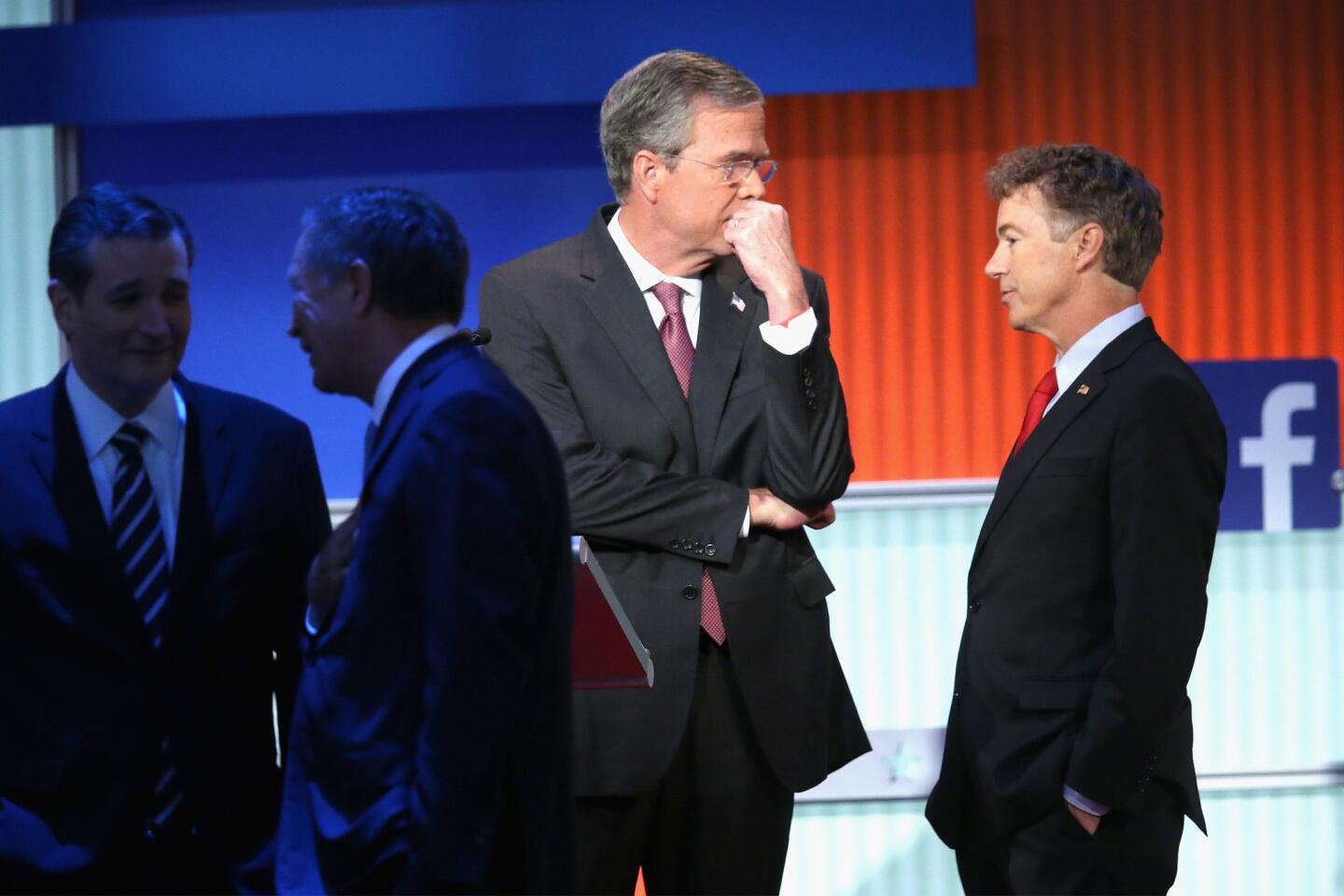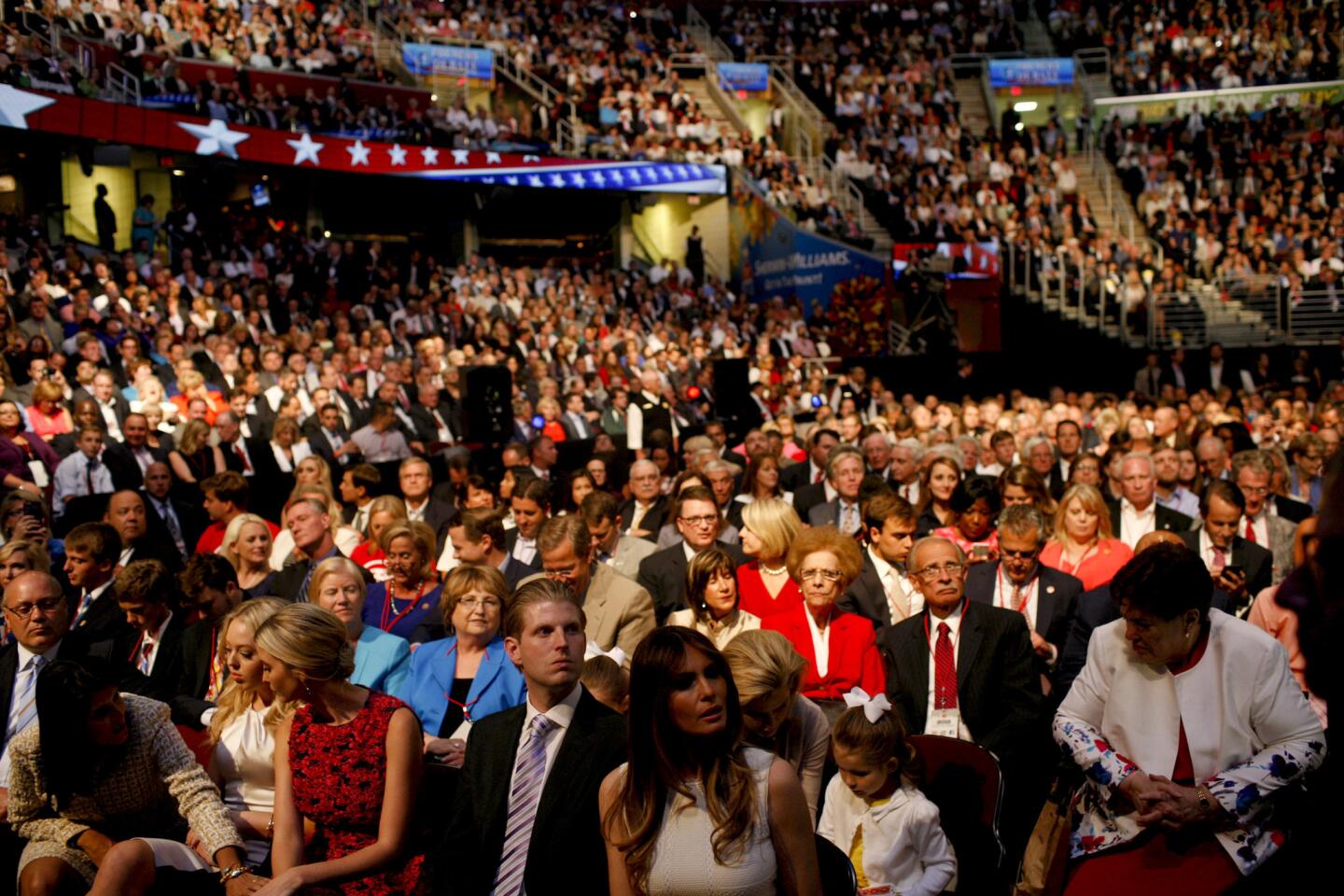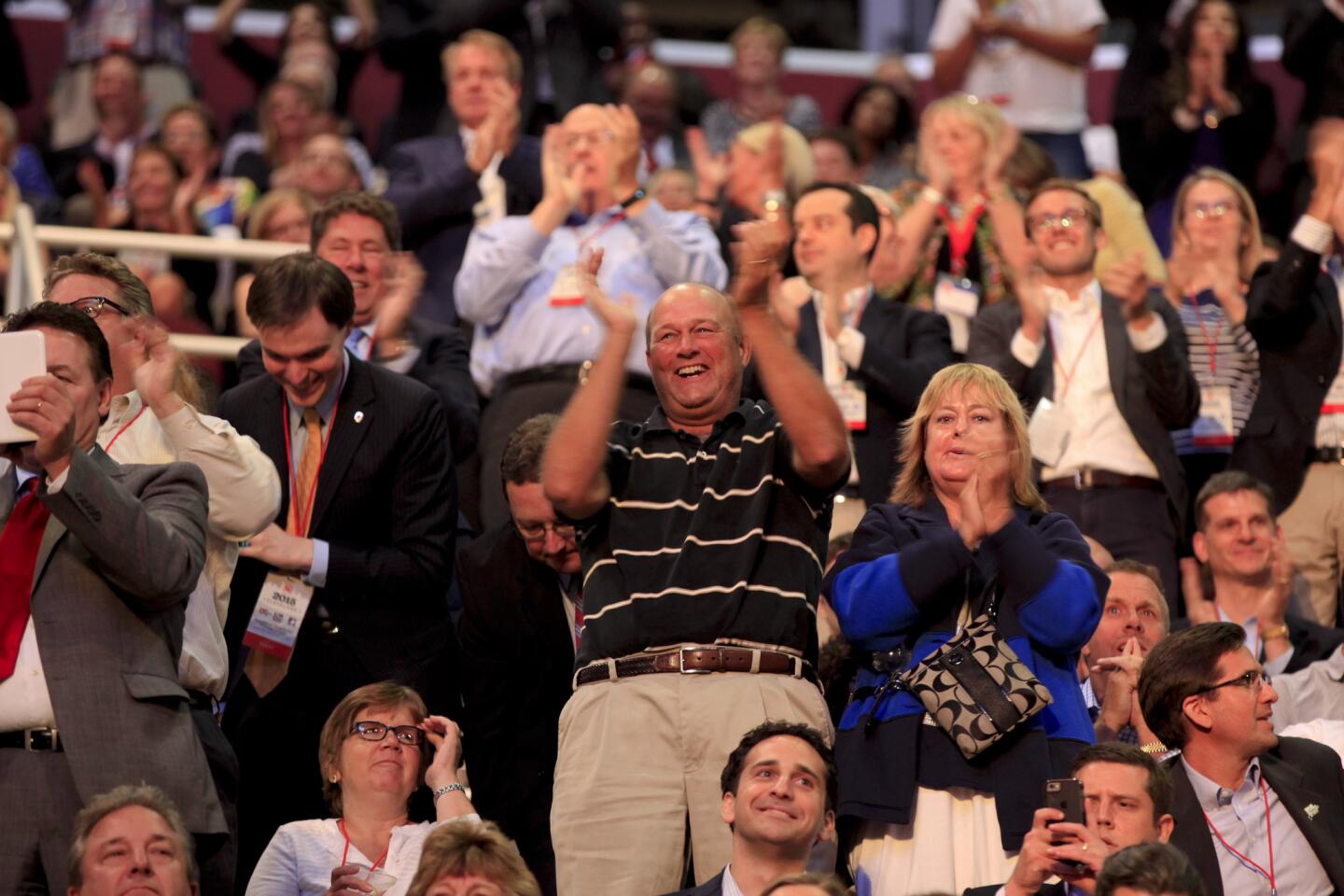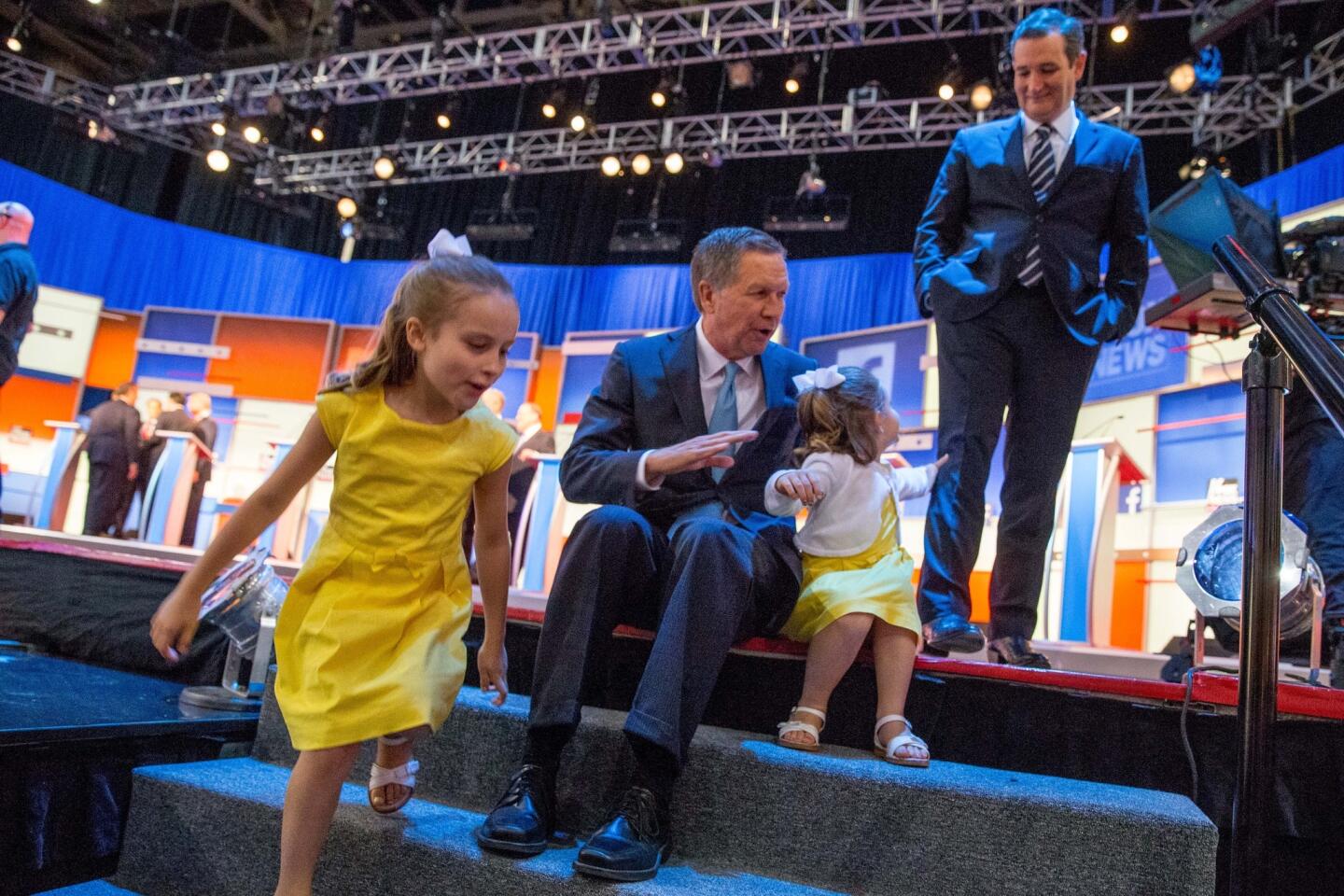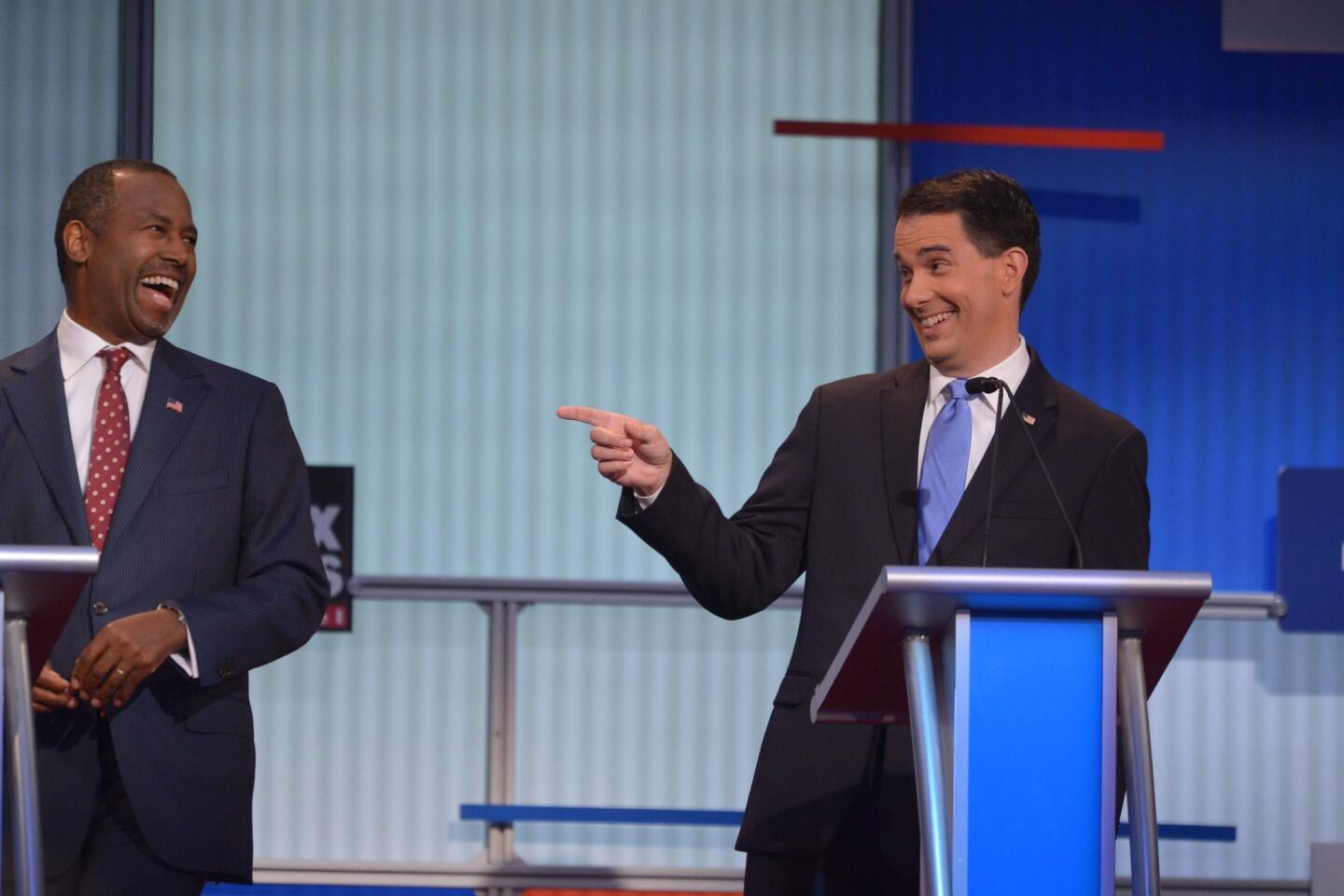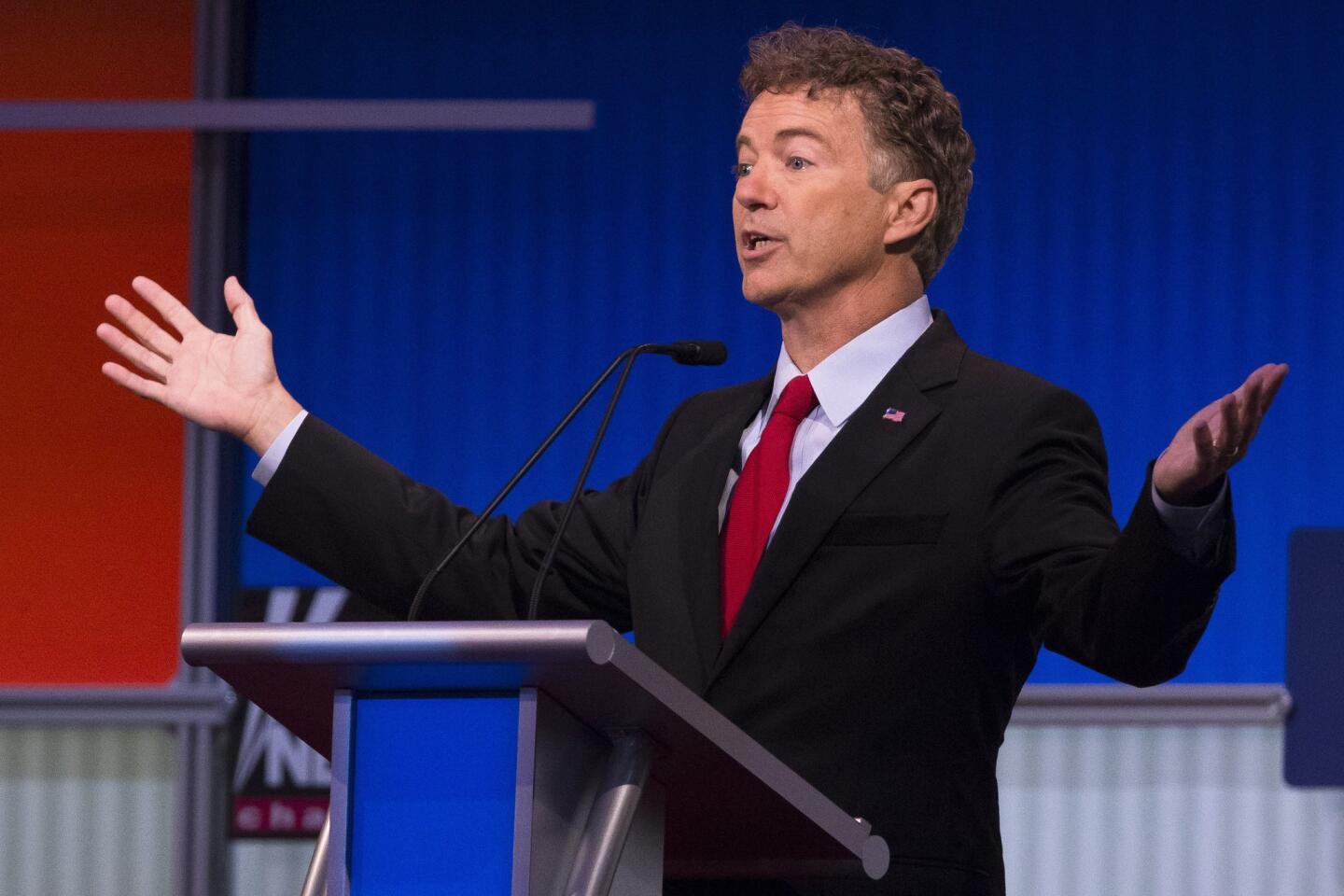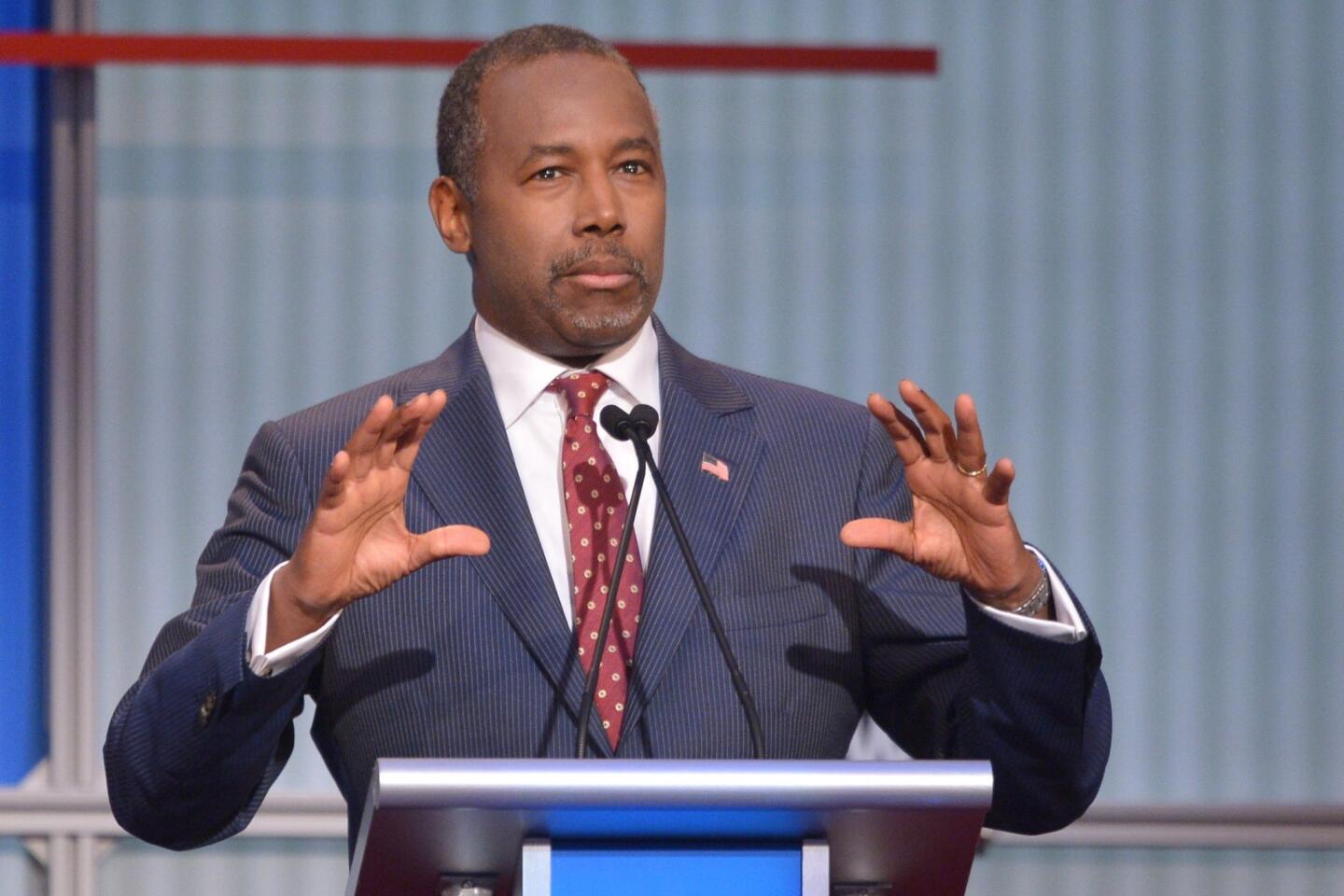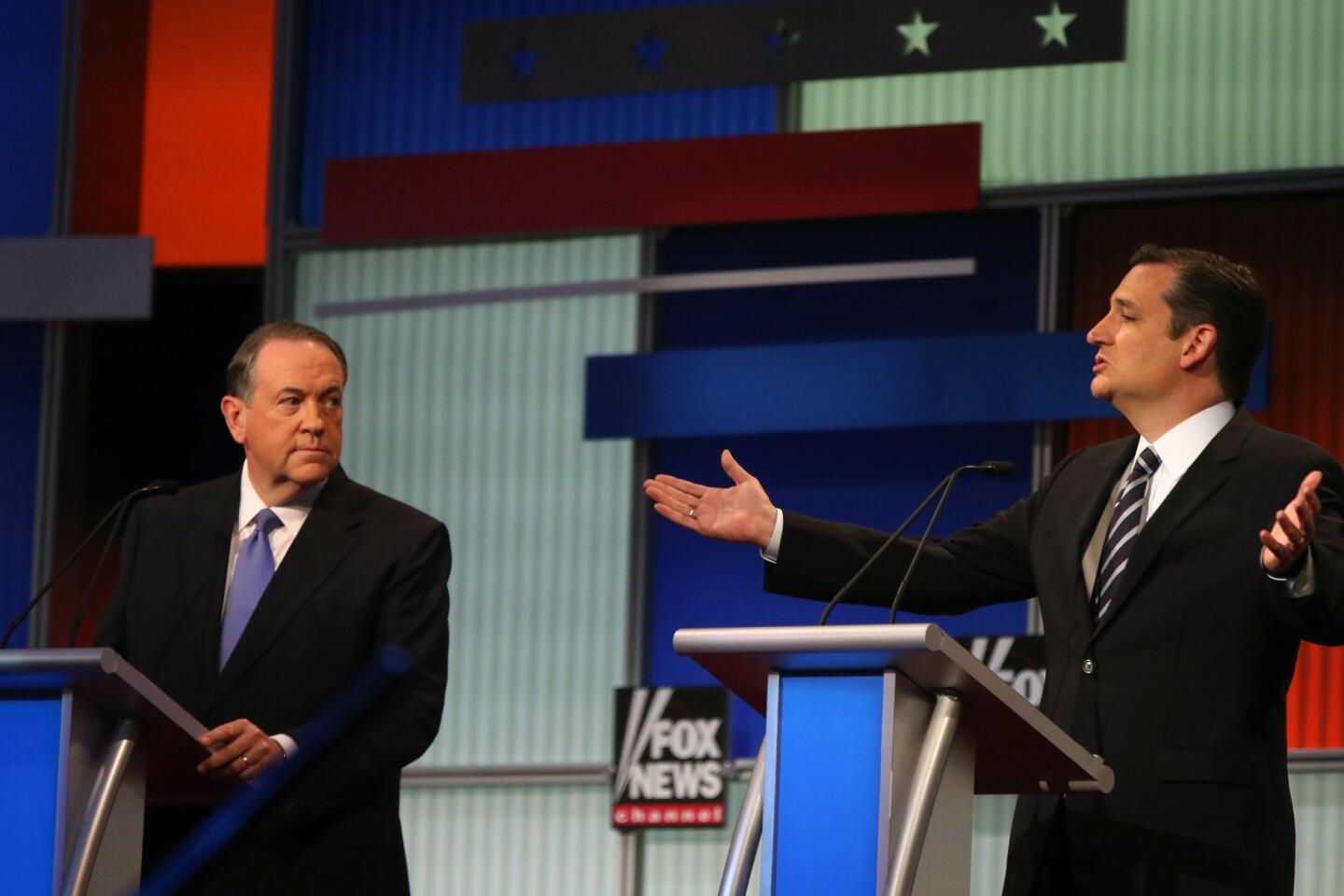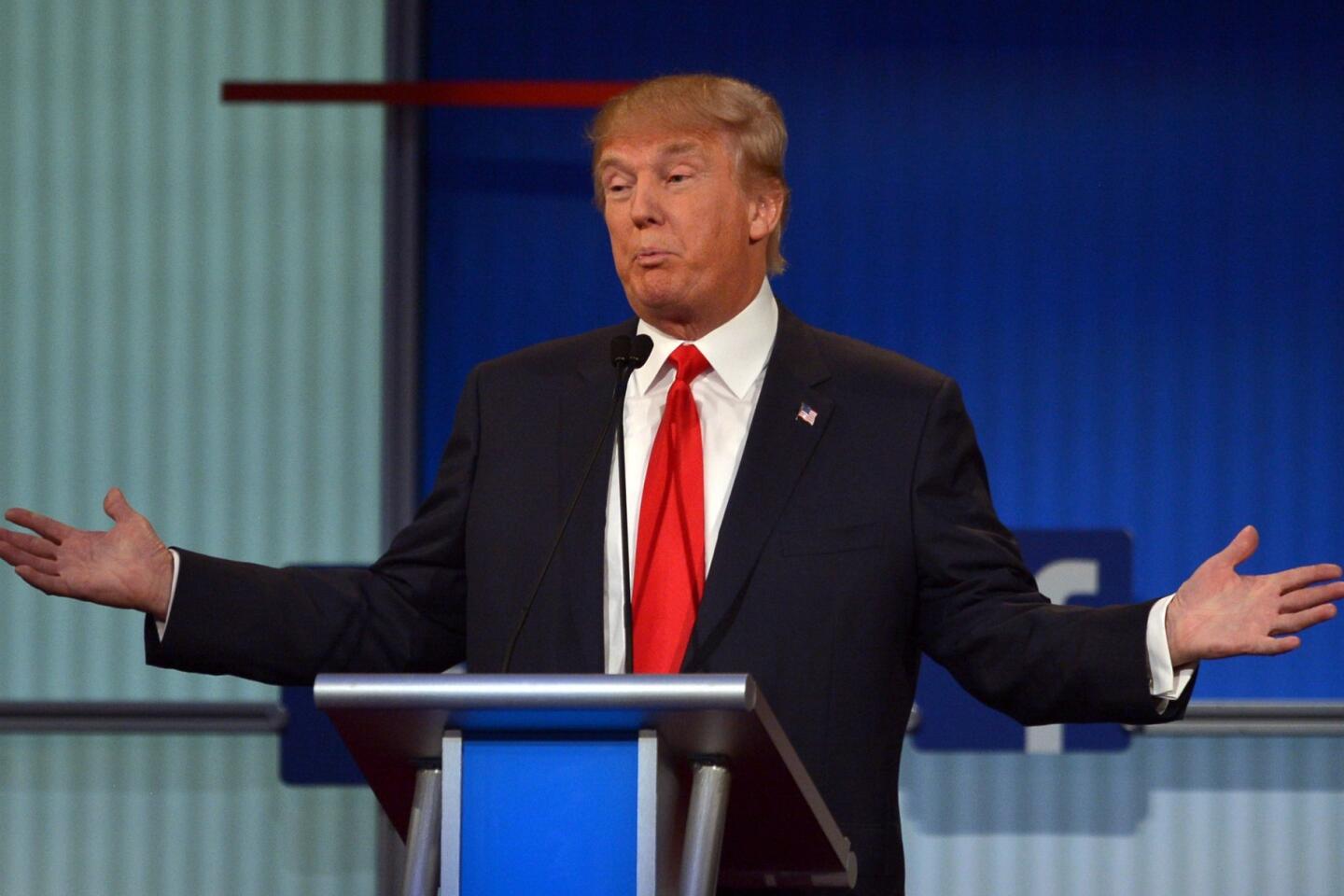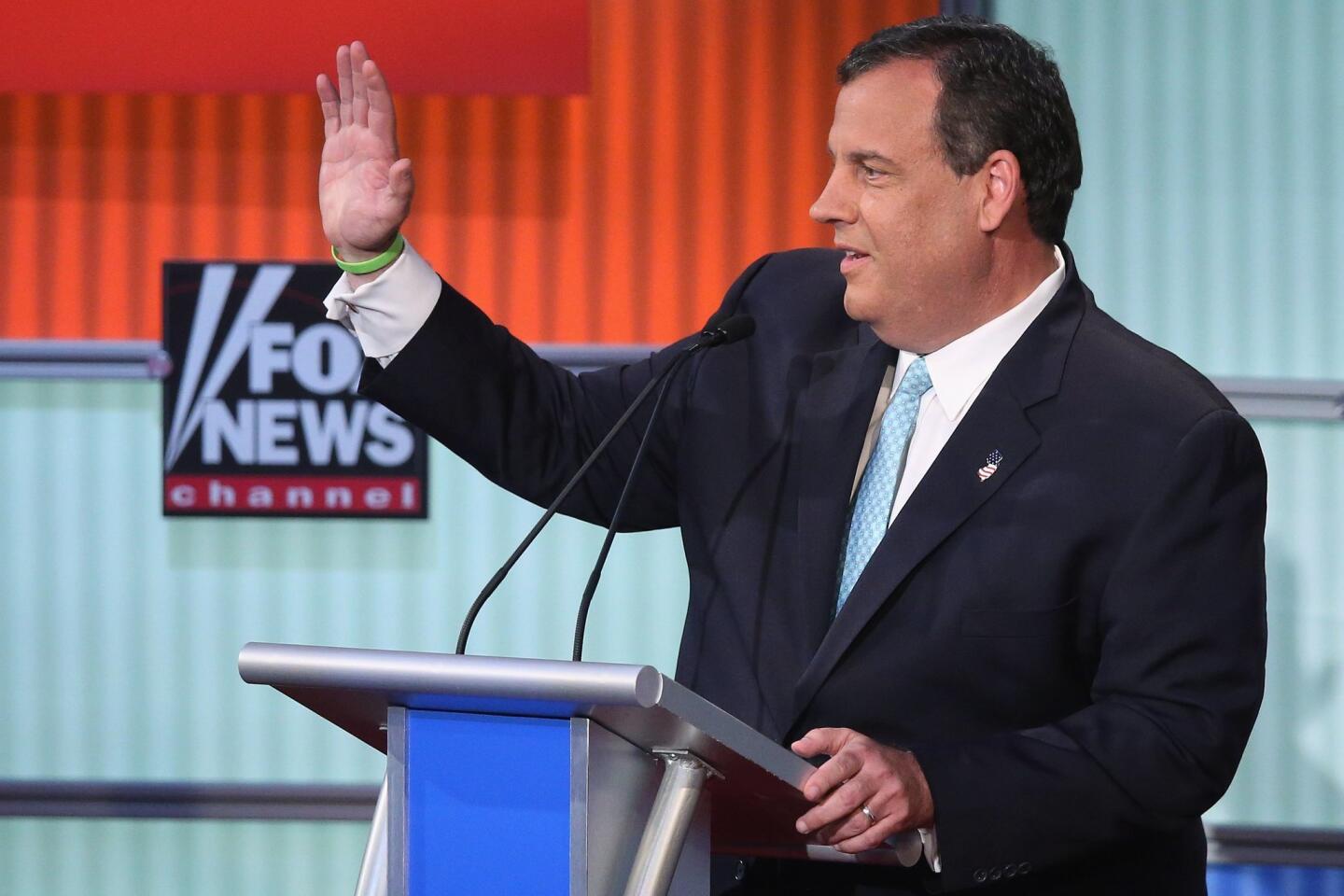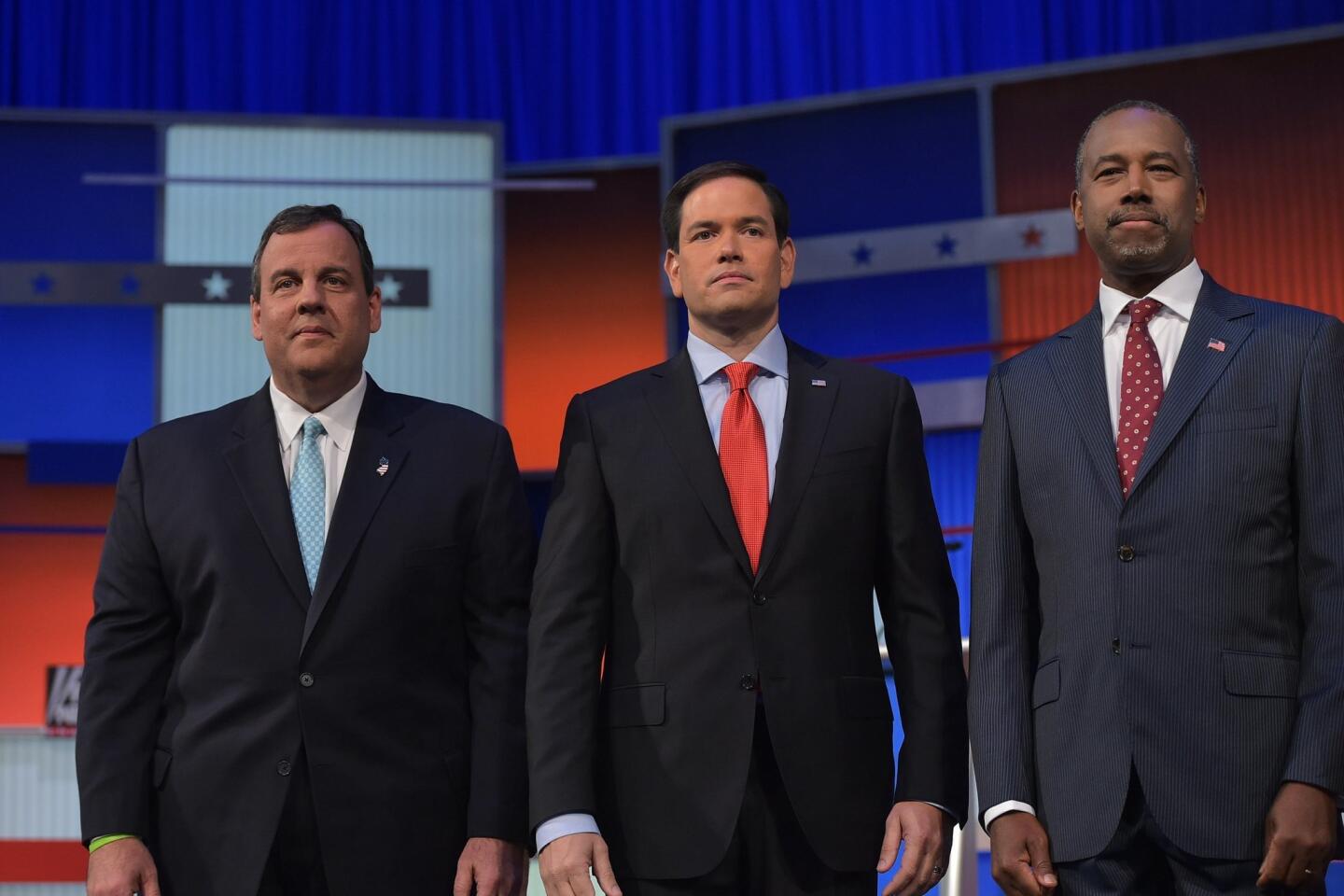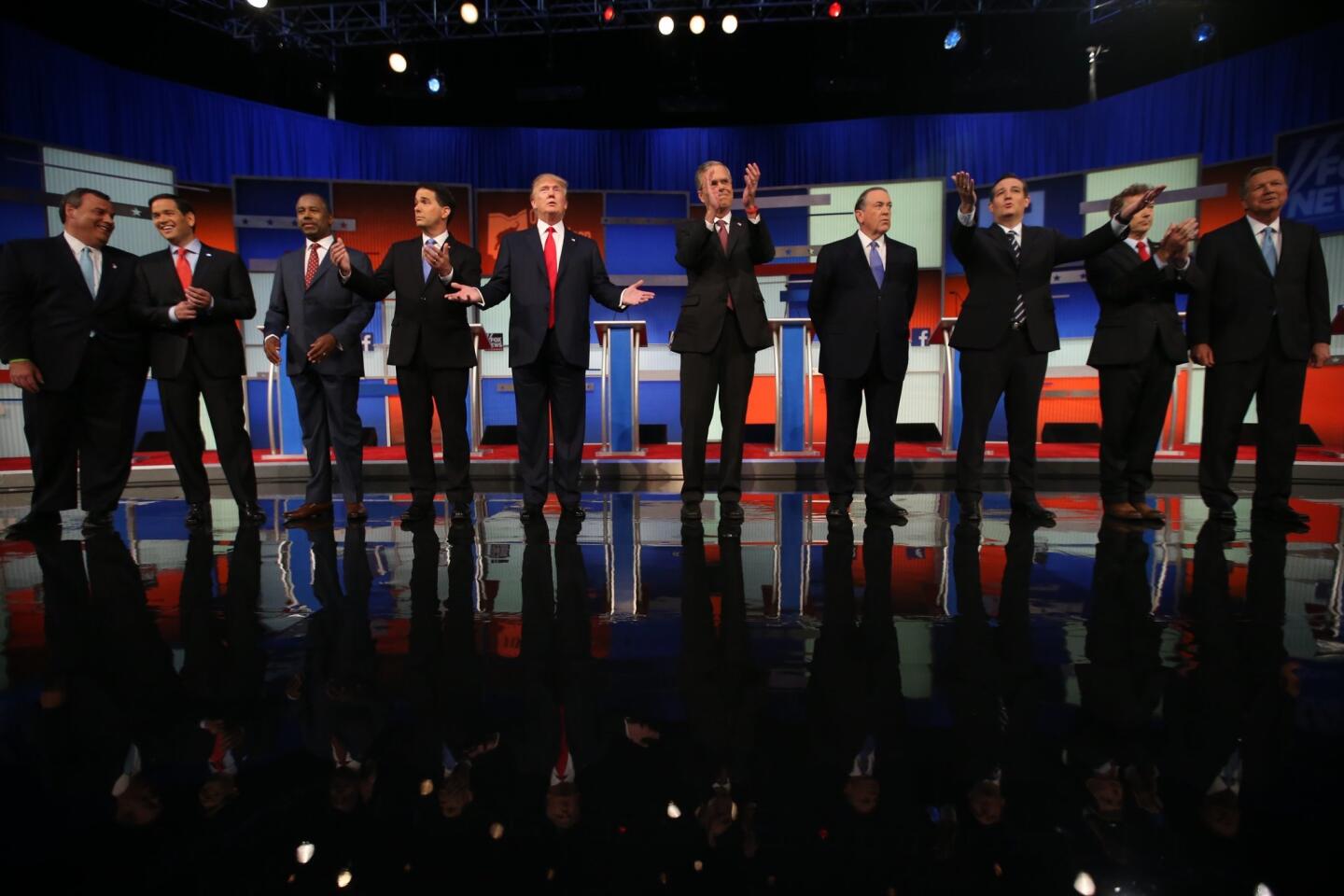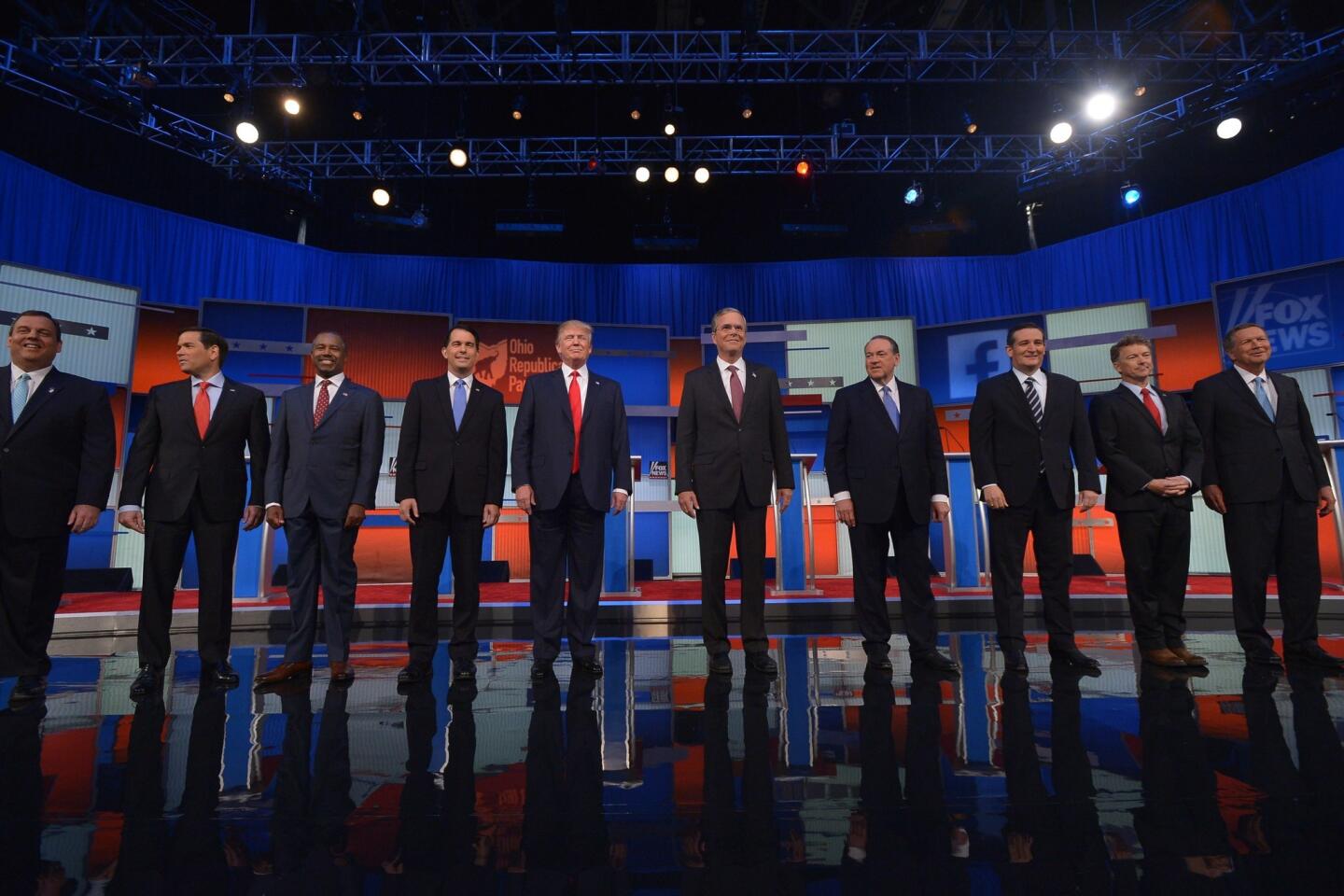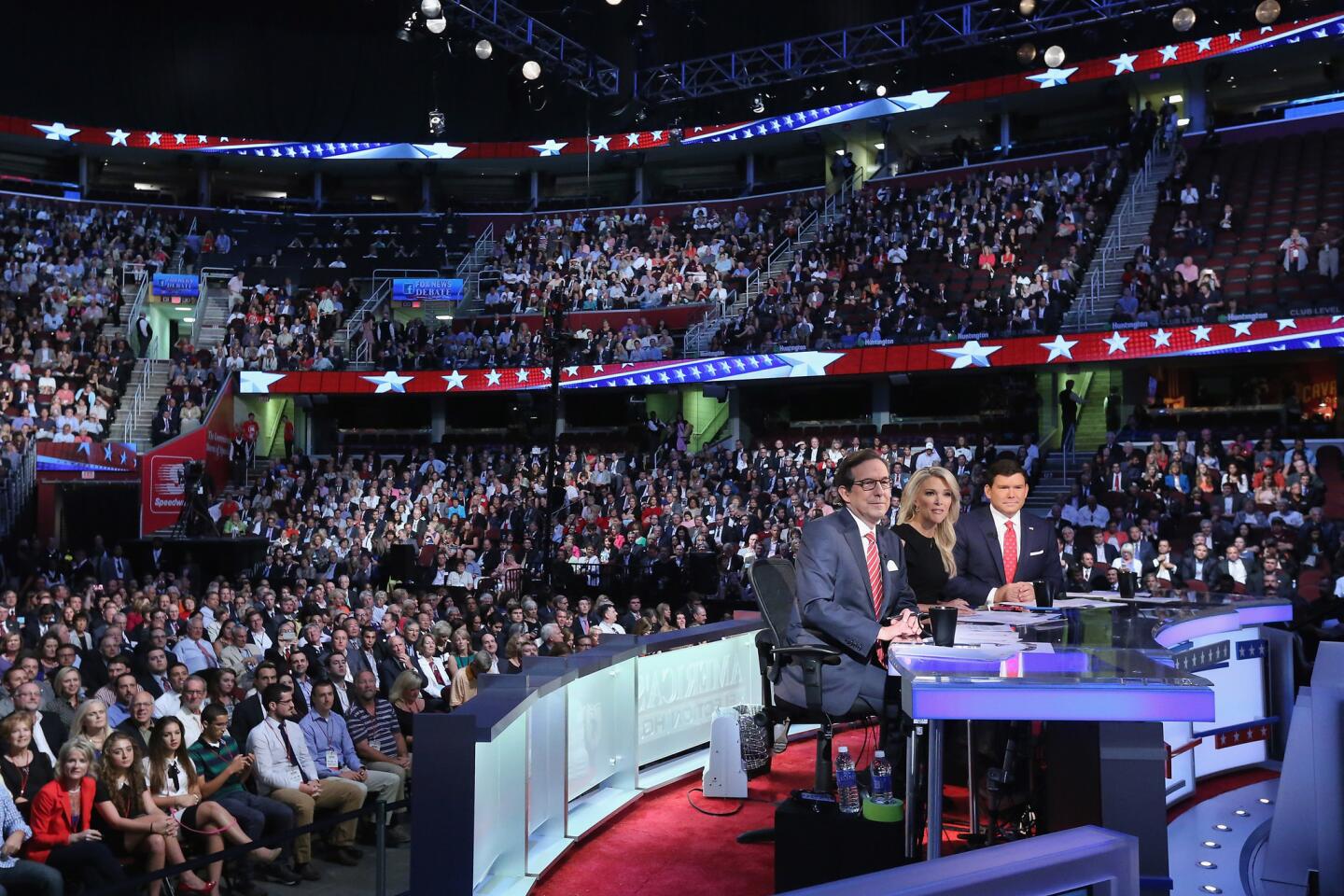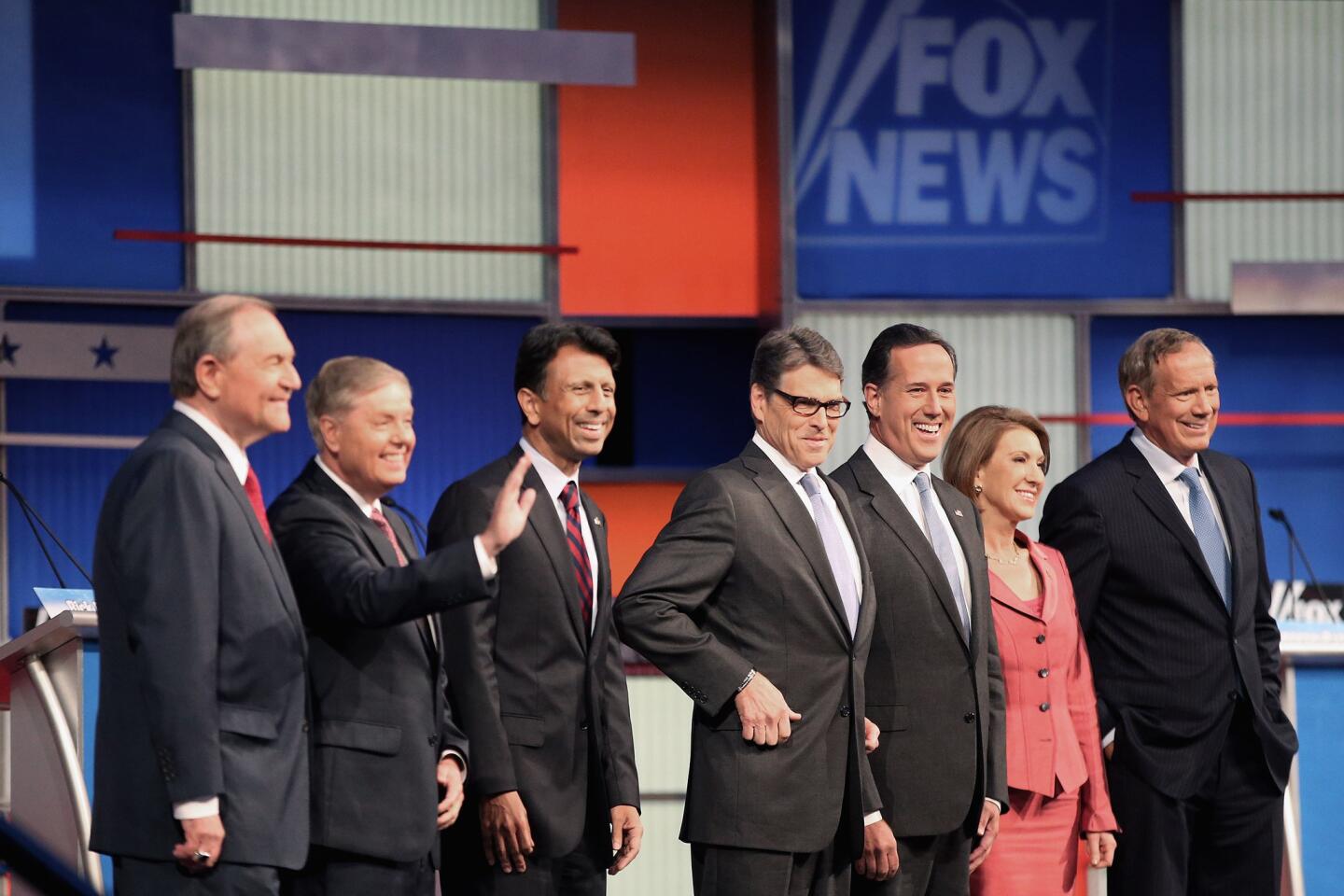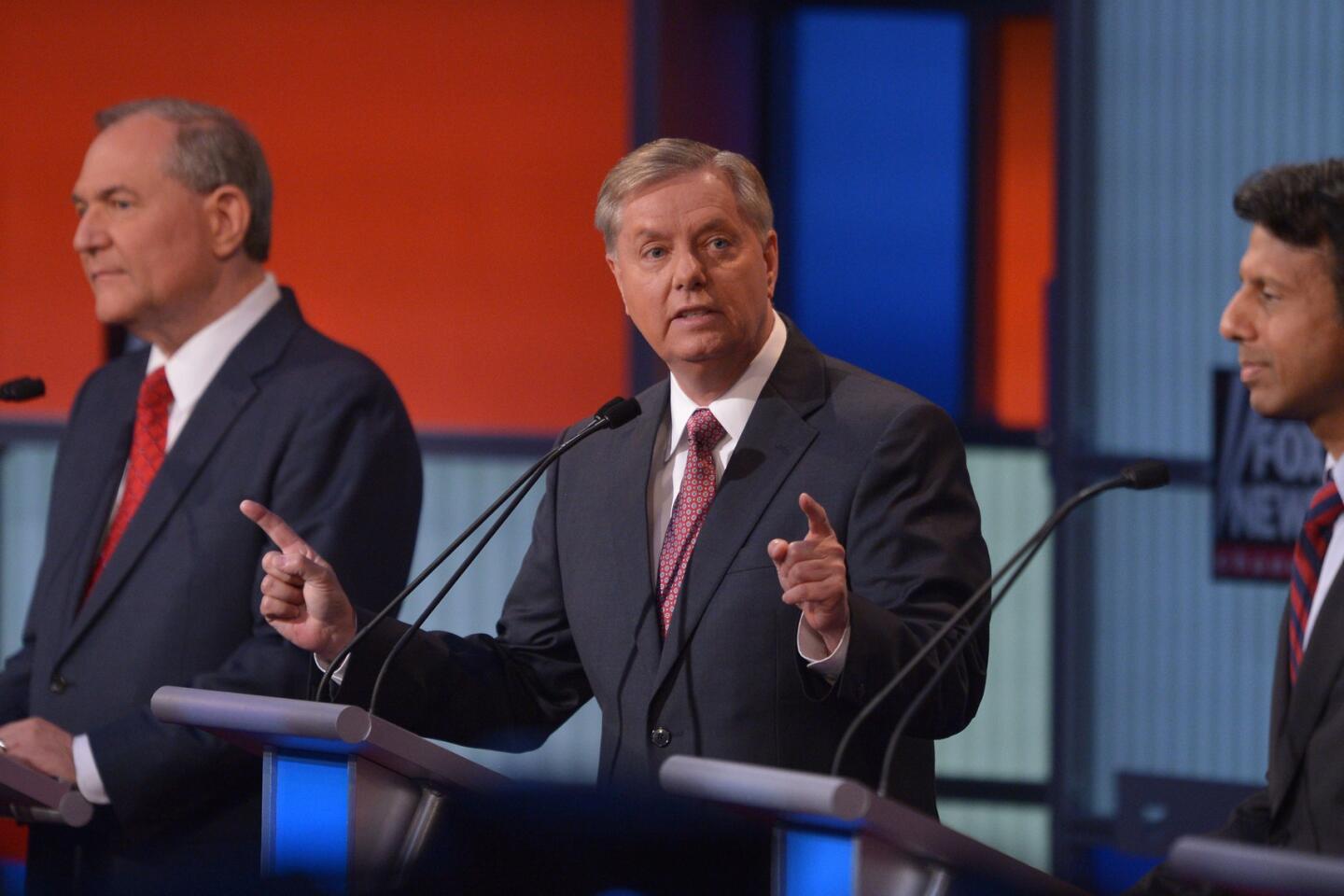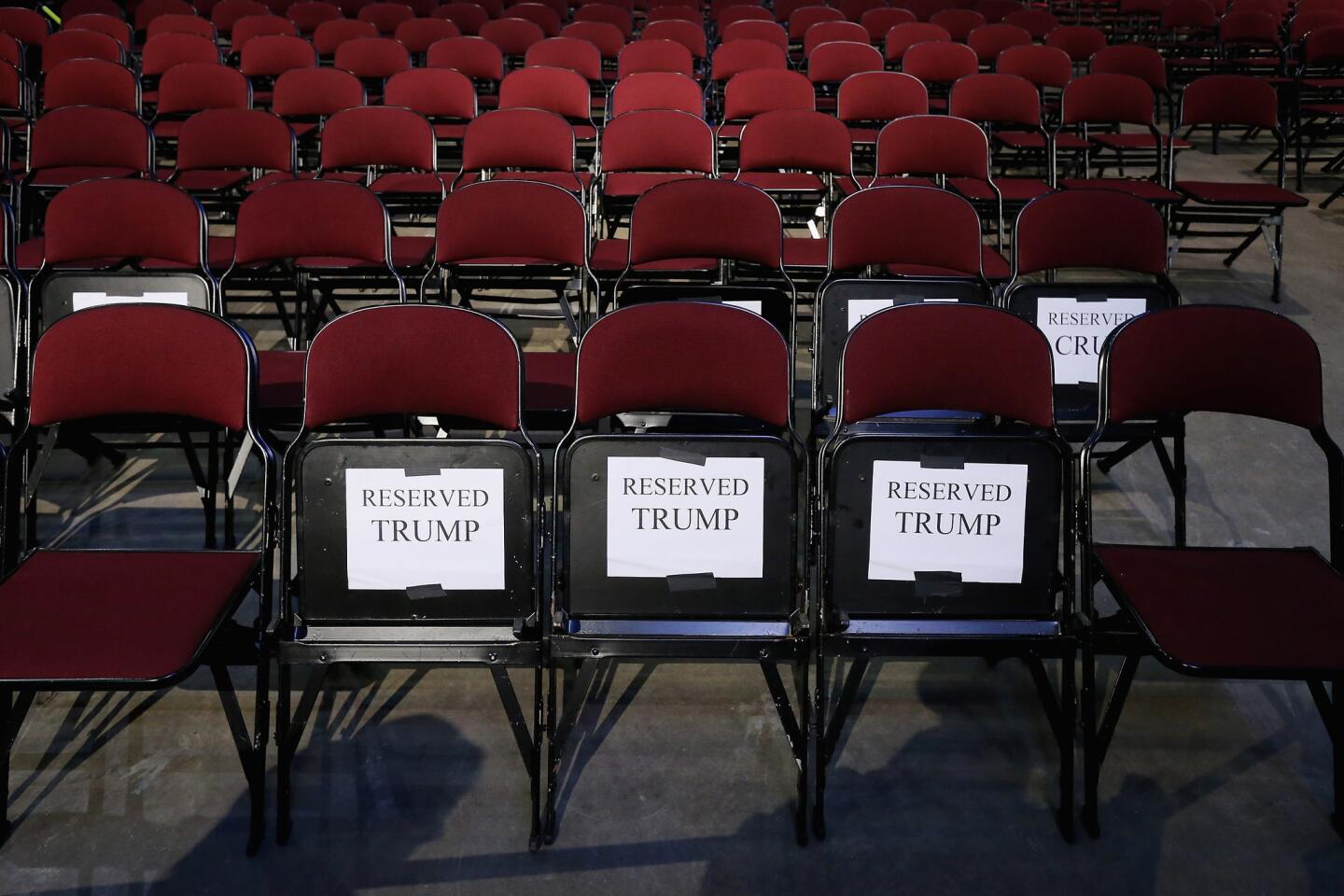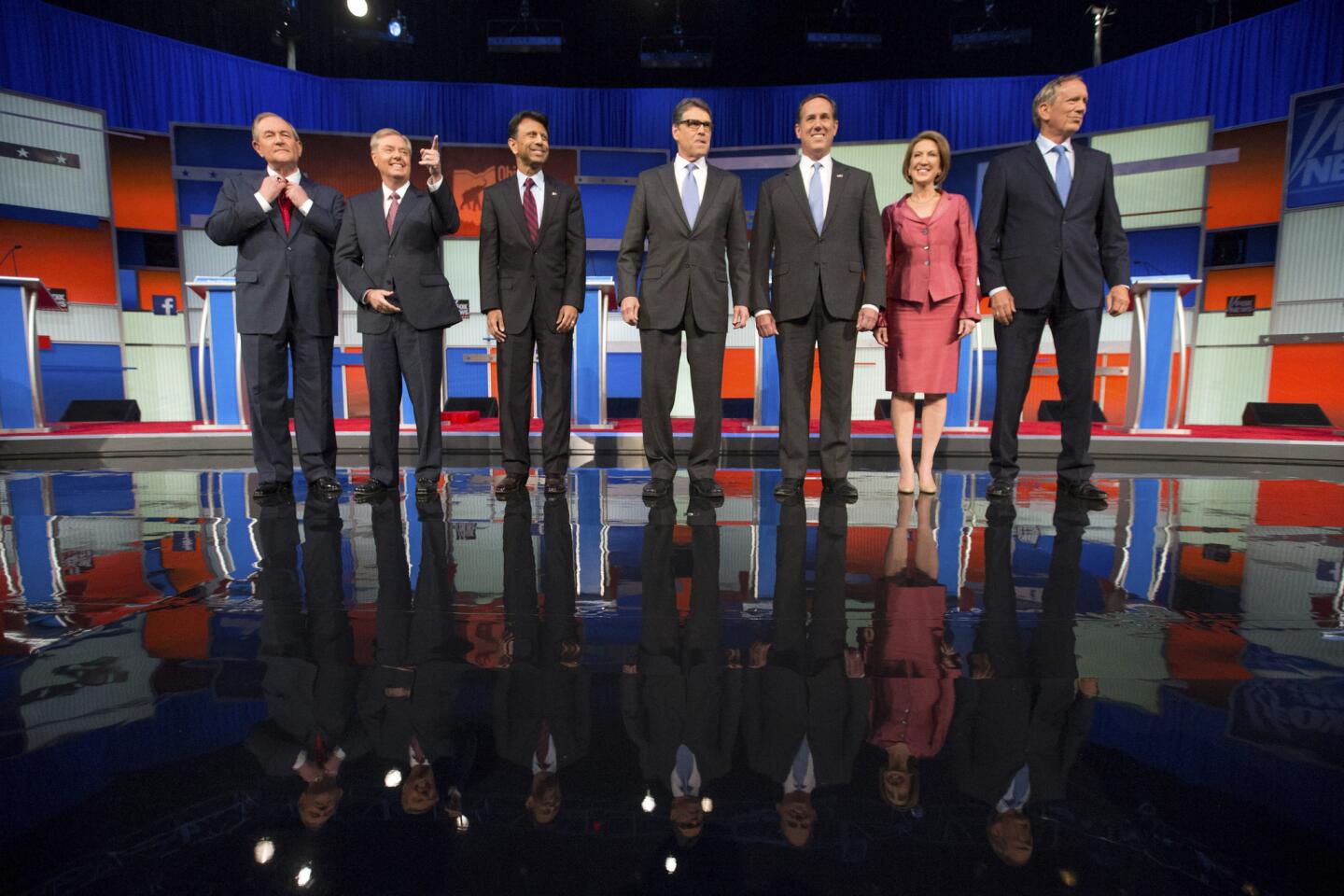Republicans try to find footing in race by attacking Trump, each other, in 1st debate
- Share via
Reporting from CLEVELAND — The leading Republican presidential candidates used their first face-to-face encounter Thursday night to accuse Donald Trump – and one another – of diverging from conservative principles as they tried to reverse the surprising dominance of the billionaire celebrity and gain a foothold in the crowded race.
Trump made news at the main forum of the first party-sanctioned debate before even uttering a single word. When a moderator asked candidates whether they would pledge to support whomever ultimately won the party’s nomination for president, as well as rule out an independent bid, Trump raised his hand to indicate he wouldn’t.
“I want to win as the Republican. I want to run as the Republican nominee,” he said. But when pressed, he repeated: “I will not make the pledge at this time.”
Sen. Rand Paul of Kentucky was quick to attack Trump, saying he was “already hedging his bets because he’s used to buying politicians.”
The exchange was just the first in what quickly became a contentious prime-time debate at Cleveland’s Quicken Loans Arena featuring the 10 Republican candidates leading in national polling. An earlier debate featured seven Republicans at the back of the pack.
For most Americans who have not immersed themselves in the machinations of an election still more than 15 months away, it was the best look yet at the Republicans hoping to prevent a third consecutive Democratic presidential term.
Trump’s unexpected and surprisingly enduring surge complicated the best-laid plans of many of the ambitious longtime officeholders. Some came prepared to challenge Trump, while others sought to build off his appeal to voters who have responded to his blunt and often controversial statements about immigration and the failures of Washington.
Ohio Gov. John Kasich, who barely qualified for the main debate as the candidate in 10th place in national polling, said Trump had hit a nerve among Americans, and those “who want to just tune him out, they’re making a mistake.”
“Now, he’s got his solutions. Some of us have other solutions,” he said, before discussing his record as a governor and congressman.
Former Florida Gov. Jeb Bush, who had been seen as the party’s most likely nominee earlier in the campaign, sought to regain his footing after comments on immigration, women’s health and the Iraq war that had made him a target from both the left and right.
“I governed as a conservative, and I govern effectively,” he said. “We left the state better off because I applied conservative principles in a purple state the right way, and people rose up.”
For their parts, Paul and New Jersey Gov. Chris Christie engaged in perhaps the night’s most bitter exchange, on whether Americans’ civil liberties were violated by government surveillance programs. When Paul said he wanted to collect records from terrorists, not innocent Americans, Christie called it a “ridiculous answer” and accused him of “just blowing hot air” on the issue for political convenience. Paul countered that he didn’t trust President Obama with him and recalled the “big hug” Christie shared with Obama late in the 2012 campaign when he visited New Jersey in the aftermath of Superstorm Sandy.
Florida Sen. Marco Rubio largely sought to stay above the fray, reserving his criticism for Democrats. Asked whether his lack of executive experience would be a liability, he said that while it was important to be qualified, the race “cannot be a resume competition.”
“If this election is a resume competition, then Hillary Clinton’s gonna be the next president because she’s been in office and in government longer than anybody else running here tonight,” he said. “This election better be about the future, not the past. It better be about the issues our nation and the world is facing today, not simply the issues we once faced.”
He did, however, differ with Trump on immigration, saying that building a wall on the U.S.-Mexico border won’t stop some from arriving through tunnels.
“We have to be able to deal with that too. And that’s why you need an e-verify system and you need an entry-exit tracking system and all sorts of other things to prevent illegal immigration,” he said.
Over two hours, the candidates were quizzed on prominent issues including the fight against the Islamic State and the Iran nuclear deal reached last month, as well as the recent controversy over funding Planned Parenthood, same-sex marriage, health care and the economy. The candidates’ jabs at one another were sometimes veiled ones, while others directed at the president and Democratic front-runner Hillary Rodham Clinton more blunt.
Former Arkansas Gov. Mike Huckabee noted how the race had been dominated by a candidate ahead in the polls but faced with scandals, seeming to be referring to Trump before he joked that he was talking, “of course,” about Clinton.
Trump not only faced occasional jabs from his rivals, but also moderator Megyn Kelly of Fox News Channel. First she asked whether his past comments on women made him unelectable, particularly if he was pitted in the general election against Clinton.
“I frankly don’t have time for total political correctness,” he said. “And honestly, Megyn, if you don’t like it, I’m sorry. I’ve been very nice to you, although I could probably maybe not be, based on the way you have treated me.”
Later she asked him about when he became a Republican, in light of his past support for Democrats.
“I have evolved on many issues over the years, and you know who else has? Ronald Reagan has evolved on many issues,” he said.
Trump was also prominently mentioned in the earlier debate among the seven trailing candidates. Former Texas Gov. Rick Perry directly accused Trump of “using his celebrity rather than his conservatism.” Former Hewlett-Packard Chief Executive Carly Fiorina acknowledged his front-runner status, saying he’s tapped into Americans’ frustration with “politics as usual.”
“I would also just say this,” she added. “Since he has changed his mind on amnesty, on health care and on abortion, I would just ask, what are the principles by which he will govern?”
The field also delivered withering attacks for Clinton, often pairing her with Obama, under whom she served as secretary of State.
“Under President Obama and Secretary Clinton, they’re working hard to change the American dream into the European nightmare,” said Gov. Bobby Jindal. “Give Bernie Sanders credit. At least he’s honest enough to call himself a socialist.”
In both events, some of the questioning was tough on candidates, homing in on perceived weaknesses and questioning their viability.
Bush was asked about prior comments on immigration reform and the war in Iraq. At the forum, Jindal was quizzed about his poor poll numbers at home. Former New York Gov. George Pataki was asked why, as the only Republican candidate who supports abortion rights, he thought he could win.
Early reviews of the first event favored Fiorina, whose polished performance has for now erased the memory of her lopsided loss in the 2010 U.S. Senate race in California.
“She was very articulate, very forceful,” said John Hancock, the Missouri state GOP chairman, who watched the forum on TV before heading over to Quicken Loans Arena for dinner and the final debate. “I expected one or maybe two of those candidates in the early debate to emerge, and I think she’s definitely on that list of candidates that’s going to emerge out of that and get a very serious look by the voters.”
The back-to-back events are a product of the Republican National Committee’s efforts to regain some measure of control over the debate process after 2012, when many in the party thought the endless string of televised events ultimately worked against it and the eventual nominee, former Massachusetts Gov. Mitt Romney.
On the Democratic side, Clinton was in California on Thursday for a roundtable on health care in Los Angeles, and fundraisers there and in San Francisco. She would be in transit during the main debate, but her campaign urged voters to tune in.
Pollster Joel Benenson warned that whatever theatrics emerge from Trump shouldn’t distract from the other candidates.
Trump’s “positions on issues are no more outrageous than any of the Republicans who are going to be out on the stage,” he said. “He may have a different persona, but they all have an identical agenda.”
Mascaro and Memoli reported from Washington and Mehta from Cleveland. Times staff writers Kurtis Lee in Los Angeles and Evan Halper, Christi Parsons and Kathleen Hennessey in Washington contributed to this report.
More to Read
Sign up for Essential California
The most important California stories and recommendations in your inbox every morning.
You may occasionally receive promotional content from the Los Angeles Times.
